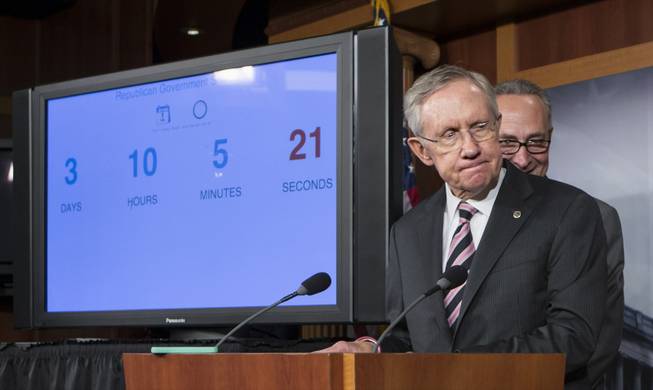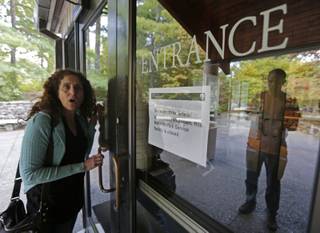
J. Scott Applewhite / AP Photo
Senate Majority Leader Harry Reid of Nev., foreground, and Sen. Charles Schumer, D-N.Y. , stand next to a countdown clock indicating three days to go before the federal government is due to run out of money, Friday, Sept. 27, 2013, during a news conference on Capitol Hill in Washington, after passing a stopgap spending bill to keep the government running, but stripped of the defund “Obamacare” language, as crafted by House Republicans.
Published Monday, Sept. 30, 2013 | 8:50 p.m.
Updated Tuesday, Oct. 1, 2013 | 12:05 a.m.
The road to the government shutdown was paved earlier this year, when a handful of Republicans in the Senate, and a larger group in the House, kept congressional leaders from appointing lawmakers to a conference committee to hash out differences between the two chambers’ budget bills.
With no common budget resolution, there could be no common budgeting. And as the months wore on, Congress came closer and closer to the brink of a shutdown that is now upon us. Now that the clock has struck midnight in Washington, Congress has missed the deadline for averting the first partial government shutdown in 17 years.
Things are now ending as they began.
In a last-ditch effort to avoid voting for the continuing resolution, devoid of any measures to defund, delay, or deconstruct Obamacare, Republican leaders in the House of Representatives called on the Senate to appoint members to a different kind of conference committee: One to hash out their differences on the continuing budget resolution.
With less than an hour to go until the midnight deadline, Senate Majority Leader Harry Reid was obviously perturbed by the last-ditch turnaround.
“We will not go to conference with a gun to our head,” Reid said, noting how Senate Democrats, led by Budget Chairwoman Patty Murray, D-Wash., had asked their Republican counterparts in the House for a conference committee on the budget resolution over the past six months, to no avail.
Reid said Monday night that he would be willing to appoint Democrats to negotiate a full-year budget with Republicans with a little more time — namely, six weeks, which is the term of the short-term budgeting measure Reid was trying to get House Republicans to vote on the past few days.
“The first thing the House needs to do is pass a clean, six-week CR; they can do that right now,” Reid said. “If they do that, we’ll agree to work with the Republicans on funding for the government through the end of the fiscal year.”
As the minutes ticked past midnight though, the House doubled down on their position, effectively rejecting that offer .
Around 1 a.m., the House voted 228 to 199 to pass essentially the same short-term budget resolution it had passed earlier Monday night, plus an extra clause requesting to form a conference committee on the short-term budget. The measure extended the federal funding through Dec. 15, and took two strikes at Obamacare: delaying the implementation of the individual mandate for a year, and ordering that members of Congress and their staffers not take federal subsidies toward the cost of their health insurance on the new exchanges.
Nevada Reps. Joe Heck, Mark Amodei, and Steven Horsford all supported the initial measure — Horsford bucking his party line on the rationale that if many workers in his district, including the employees of the local Culinary Union, would not be eligible for subsidies because they get insurance through self-funded, multi-employer plans, neither should members of Congress. Horsford didn’t vote for it the second time.
By the time the House had finished its voting for the night, the government had already gone into shutdown mode, and the Senate had departed the Capitol to get some sleep before resuming the budget fight Tuesday morning.
How long the shutdown remains in effect will determine the ramifications. In the immediate term, national recreation areas such as Lake Mead and Red Rock will shut down. Federal employees will likely be furloughed, or asked to work without pay. Visas will not be processed.
But the health care exchanges will go still online Tuesday morning.


Join the Discussion:
Check this out for a full explanation of our conversion to the LiveFyre commenting system and instructions on how to sign up for an account.
Full comments policy